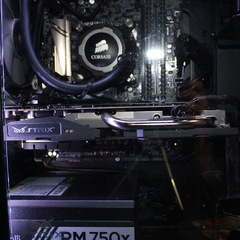-
Posts
415 -
Joined
-
Last visited
Reputation Activity
-
 asquirrel got a reaction from GDRRiley in LTT is About to Change
asquirrel got a reaction from GDRRiley in LTT is About to Change
If I lived in can-a-derp I'd give this more than a passing consideration. My personal love would be in testing enterprise equipment (Fiber Channel storage arrays, fiber channel and IP switches, disk packs from big vendors like Dell and Western Digital vs DIY solutions like 45 drives and backblaze). But I'm a US citizen who is never going to move across the border.
And, yes, I am qualified to test all of that stuff. I did it as my day job for about 5 years and loved it. My main focus back then was finding bugs. And boy did I find some good ones.
-
.png) asquirrel got a reaction from Lurick in LTT is About to Change
asquirrel got a reaction from Lurick in LTT is About to Change
Imagine if Linus took a page out of Akamai/Google/Facebook/Amazon's playbook and starting OEMing LTT branded 10G Ethernet switches? 4 years ago Akamai was ordering semi-truck fulls of 48-port 10G (+8 100g uplinks) switches for ~$6500 each. They had to have their own firmware engineers to make that work, but that's a huge part of why Akamai's network is so stable, same for AWS. LTT could make a killing undercutting Cisco and others by 1/2 or more for the customers who only need a few basic features (tagging and native vlans, ZDT firmware upgrades, etc). How many options exist in a Cisco nexus firmware that literally never get used, but are still attack and bug surfaces? This is why these companies OEMed their own servers and switches. Now being an integration tester for that would be super hella fun. But...again, not enough to live in Canada for.
-
 asquirrel got a reaction from Lurick in LTT is About to Change
asquirrel got a reaction from Lurick in LTT is About to Change
If I lived in can-a-derp I'd give this more than a passing consideration. My personal love would be in testing enterprise equipment (Fiber Channel storage arrays, fiber channel and IP switches, disk packs from big vendors like Dell and Western Digital vs DIY solutions like 45 drives and backblaze). But I'm a US citizen who is never going to move across the border.
And, yes, I am qualified to test all of that stuff. I did it as my day job for about 5 years and loved it. My main focus back then was finding bugs. And boy did I find some good ones.
-
 asquirrel reacted to Heliian in Tesla suspends purchases using Bitcoin citing energy concerns
asquirrel reacted to Heliian in Tesla suspends purchases using Bitcoin citing energy concerns
He's just pumping and dumping for his own benefit at this point. It's becoming a farce.
-
 asquirrel got a reaction from soldier_ph in Cold Wars: Right to Repair needed for McDonald's Ice Cream Machines
asquirrel got a reaction from soldier_ph in Cold Wars: Right to Repair needed for McDonald's Ice Cream Machines
Summary
The need for Right to Repair extends even to McDonald's Ice Cream machines. A franchise requirement to use a specific Taylor ice cream maker gives Taylor a monopoly and McDonald's doesn't care because the franchises bear the burden of the cost, rather than McDonald's itself. The company that made and sold a tool to help the problem gets shuttered.
Quotes
My thoughts
Technically not my thought, but: The problem with right to repair, and the fact that you don't own anything, is already so far ingrained in society that the meme of "Just don't buy Apple" doesn't work. Even business-to-business contracts are infected with this cancer. The real way to make progress with Right to Repair is to make it, effectively, impossible to have a large business that even has the kind of leverage needed to pull off such a monopoly. But, I'll settle for schematics, board views, and access to component-level parts.
Sources
https://www.wired.com/story/they-hacked-mcdonalds-ice-cream-makers-started-cold-war/
-
 asquirrel got a reaction from Vanderburg in New Ethereum ASIC miner announced, with hashrate equivalent to 32 RTX 3080
asquirrel got a reaction from Vanderburg in New Ethereum ASIC miner announced, with hashrate equivalent to 32 RTX 3080
Oh boy! Bitmain launching a new miner! Hurry up and order! They'll take your money today, build your miner, use it for 3 months in their warehouse while building newer, more efficient models, and once their v1.1 is available, finally ship your model to you and blame 'unexpected demand' for the delay. Bitmain is a scumbag company. I wish chip fabbing was as easy as buying a CNC router. I'd love a side project to make ASICs in a non-scumbag way.
-
 asquirrel got a reaction from Dracarris in Our Craziest Cooling Project Yet
asquirrel got a reaction from Dracarris in Our Craziest Cooling Project Yet
I see the vision you guys were going for, but...spend more time on projects than this. Shouting "REFILL IT!" over and over isn't appealing. Jank is fine, but stop, fix the leaks, and do a proper test. Use proper fittings. Yes, I know that means it gets done on Monday after a trip to Autozone for some proper water pipe fittings, but meh. I'd rather than then this nonsense. I actually downvoted this video on youtube purely because it was so over the top. Seriously guys, put a little more effort and time into the videos.
-
.png) asquirrel got a reaction from WkdPaul in Will crypto madness end?
asquirrel got a reaction from WkdPaul in Will crypto madness end?
@oskar23 When will the crypto madness end? Probably by the end of the year. There's always a bit of randomness, but we've already had one bull run up to 60k. Right now, money is flowing out into altcoins. Look at siacoin, doge, litecoin, vertcoin, etc. A LOT of well known 2017 altcoins got a HUGE pump within the past two weeks. Siacoin, for example, is up 20x from it's low around a year ago. This means we *should* still be near the beginning of the crypto surge. The rough order from previous crypto surges I've seen (starting from the previous ATH price) is:
1. Rapid BTC selloff.
2. Altcoin trading ratios (1 doge = 0.0XXXXXX BTC) go up at around a 2-day lag from BTC. So, basically, if you were hodling DOGE then it would hit the best trading ratio to BTC (the most BTC for your doge) 2 days after BTC's ATH and subsequent crash. This happens because some people try to shift their BTC to altcoins to hodl the value without losing as much. Basically, hedging their losses.
3. For the next year, the BTC price tumbles, slowing down after 3 months, but having a 9 month tail until it hits the new 'all time low' for this interval.
4. During this same timeframe, altcoin trading ratios and prices tumble as well, far faster and more dramatically than BTC in most cases. A HUGE part of what makes that 9 month long tail is people selling their altcoins for BTC, then selling the BTC, to try and recover some of their 'lost' capital.
5. At 1 year post crash, we hit rock bottom, and the next bubble starts building. This was around $3k/BTC back in 2019. Or $230 in 2016.
6. BTC rises, sometimes slow, sometimes fast, building hype. Once BTC crosses its old ATH, people start investing into altcoins. In 2017, this happened basically the same day/week that BTC crossed $1000 for the second time ever. In 2020/2021, it didn't happen for 2-3 months after BTC crossed its old ATH.
7. BTC rises, but there are frequent and dramatic 'dips' which people panic and FOMO over, but almost all of these are due to BTC being traded for altcoins in huge volumes, which temporarily creates a large supply of BTC needing to be bought, driving the price down.
8. Eventually, around 1 year after the all-time-low for this cycle (~$3200 for BTC this time around), on a logarithmic scale the price of BTC will go vertical or near-vertical and the bubble will pop within a month or two of that happening. Return to step 1.
This is not financial advice. I am not a financial advisor.
And, because I'm me, here's the dashboard I made for tracking these BTC/altcoin phenomena I talk about before I got more recent data:
And here's the trading price of siacoin during that same interval (it's in that stackup, but here it is by itself)
and here's more recent data (note the top of the graph changed from 25k to 80k, this is automatically done).
and the siacoin:
-
 asquirrel got a reaction from shadow_ray in Words aren't enough. We need ACTION.
asquirrel got a reaction from shadow_ray in Words aren't enough. We need ACTION.
So, with free market capitalism, the overall idea is "The best idea wins". In 2021, current IP law and many other business laws are setup to specifically prevent free market capitalism. Patents and copyrights existed because there is a recognition that thought has value, and not everyone with a good idea also has the means to capitalize on that idea through manufacture or print. Thus, patents and copyrights exist to ensure that the creator with an idea can reap the monetary rewards for having their idea.
Companies have perverted this process to say "We own this idea, and nobody can use it except us!" which is completely contradictory to the spirit of patents and copyrights. The law should say "by obtaining this patent or copyright, you release the IP into the public domain, but anyone who uses that IP owes you a fee for their use." And, the fee should be a percentage of the total manufacturing cost. So, for a book, the cost of the paper, ink, binding process, man-hours/labor cost, etc. The fee is a percentage and fixed for all types. This does create some winners and losers in the ideas space, but it's far easier for society to enforce fairly. "You printed 10 copies of this book for your local book club and it cost you $30 per book, the royalty rate is 1%, you how the creator $3!" "But I didn't sell them, I gave them away!" "You used a copyrighted work; pay up."
In the digital age, where books are PDFs and manufacturing costs are nearly free...well, you'd think that would mean authors make no money, but every tom-dick-and-harry who wants to make their own audiobook version now can, so long as they pay the author a chunk for every download based on hosting costs. And everyone who mirrors the PDF gives the owner a slice based on their hosting costs. It sounds dystopian, but it is a system that will both work, and be rife with corruption and piracy until society decides to stop being dicks to each other.
Such a model rewards economies of scale; the person or group that can manufacture a good for the lowest input cost wins. It also prevents IP hoarding, as any IP you want to keep secret must be like the Coca-Cola formula, and kept secret as a trade secret. But, a trade secret must be, well, secret. So if you have all your company IP as trade secrets, and someone posts a ZIP file of all of them online, well, you just lost all your IP in one day. That alone would discourage IP hoarding in trade secrets.
The overall goal is that knowledge is free for people to use, and the person with the idea is due their fair cut. But only if you actually use their idea. Newton and Leibniz probably came up with calculus independently; so neither would owe royalties to the other. But if you used calculus, would each get half the royalty, or would you get to pick who you thought was less of an asshole? *shrug* for society to decide, I think. 50/50 sounds fairer to me though, and less prone to popularity contests. In this way, someone who designs a new chip without using existing IP, does not owe money to the person who originally came up with the idea. You can't 'steal' what you never knew existed. It also gets around the problem of China literally stealing everything on earth and not paying for it; so we now have a way to get back at them for that. 😛
I'm sure this plan has flaws, and needs some work, but I think the core argument, that the IP problems you point out, are best solved by admitting the current model is fundamentally broken and contrary to the original purpose, and going in a new direction.
-
 asquirrel got a reaction from kirashi in Words aren't enough. We need ACTION.
asquirrel got a reaction from kirashi in Words aren't enough. We need ACTION.
So, with free market capitalism, the overall idea is "The best idea wins". In 2021, current IP law and many other business laws are setup to specifically prevent free market capitalism. Patents and copyrights existed because there is a recognition that thought has value, and not everyone with a good idea also has the means to capitalize on that idea through manufacture or print. Thus, patents and copyrights exist to ensure that the creator with an idea can reap the monetary rewards for having their idea.
Companies have perverted this process to say "We own this idea, and nobody can use it except us!" which is completely contradictory to the spirit of patents and copyrights. The law should say "by obtaining this patent or copyright, you release the IP into the public domain, but anyone who uses that IP owes you a fee for their use." And, the fee should be a percentage of the total manufacturing cost. So, for a book, the cost of the paper, ink, binding process, man-hours/labor cost, etc. The fee is a percentage and fixed for all types. This does create some winners and losers in the ideas space, but it's far easier for society to enforce fairly. "You printed 10 copies of this book for your local book club and it cost you $30 per book, the royalty rate is 1%, you how the creator $3!" "But I didn't sell them, I gave them away!" "You used a copyrighted work; pay up."
In the digital age, where books are PDFs and manufacturing costs are nearly free...well, you'd think that would mean authors make no money, but every tom-dick-and-harry who wants to make their own audiobook version now can, so long as they pay the author a chunk for every download based on hosting costs. And everyone who mirrors the PDF gives the owner a slice based on their hosting costs. It sounds dystopian, but it is a system that will both work, and be rife with corruption and piracy until society decides to stop being dicks to each other.
Such a model rewards economies of scale; the person or group that can manufacture a good for the lowest input cost wins. It also prevents IP hoarding, as any IP you want to keep secret must be like the Coca-Cola formula, and kept secret as a trade secret. But, a trade secret must be, well, secret. So if you have all your company IP as trade secrets, and someone posts a ZIP file of all of them online, well, you just lost all your IP in one day. That alone would discourage IP hoarding in trade secrets.
The overall goal is that knowledge is free for people to use, and the person with the idea is due their fair cut. But only if you actually use their idea. Newton and Leibniz probably came up with calculus independently; so neither would owe royalties to the other. But if you used calculus, would each get half the royalty, or would you get to pick who you thought was less of an asshole? *shrug* for society to decide, I think. 50/50 sounds fairer to me though, and less prone to popularity contests. In this way, someone who designs a new chip without using existing IP, does not owe money to the person who originally came up with the idea. You can't 'steal' what you never knew existed. It also gets around the problem of China literally stealing everything on earth and not paying for it; so we now have a way to get back at them for that. 😛
I'm sure this plan has flaws, and needs some work, but I think the core argument, that the IP problems you point out, are best solved by admitting the current model is fundamentally broken and contrary to the original purpose, and going in a new direction.
-
 asquirrel got a reaction from kirashi in Words aren't enough. We need ACTION.
asquirrel got a reaction from kirashi in Words aren't enough. We need ACTION.
Right now Apple, John Deere, and many others have gone to manufacturers of chips, such as Texas Instruments, Intersil, and others, and said "Don't sell this chip to anyone but us!". For example, the ISL6259 is a totally normal charging chip which controls when to send power to your battery or not to via USB. This was used in macbooks up until around 2016, when Apple decided went to Intersil and said "Don't sell this chip to anyone but us!" and Inersil said "uh...that's an industry standard chip, we can't do that." so Apple said "fine! Reverse pins 2 and 3, then only sell THAT chip to us!" and thus the ISL9240 was created. The ISL9240 cannot be bought *anywhere* but it's literally just an ISL6259 with the pins in a different order.
That kind of shit is what Right to Repair is asking for: when Apple, John Deere, and other companies pull shit like that, they CANNOT tell Intersil "Don't sell this chip to anyone!". Instead, that ISL9240 must be available in the supply chain at a reasonable cost. Whether that is via Apple directly, or from Intersil, someone must sell the chip and someone must sell the chip for the < $5 price tag it actually has (none of this "it's for sale!...for $300!" bullshit).
Right to Repair does not care who stocks the part, only that the part IS sold on the market by someone at a fair and reasonable price. It does not require anyone to keep stock of parts long term, and no bill I'm aware of has yet realized that they need to include a provision that full schematics/designs for chips no longer being manufactured must be published somewhere so that another company can begin manufacturing them again if needed. But whatever, baby steps.
Make sense now?
-
 asquirrel reacted to ivycomb in Words aren't enough. We need ACTION.
asquirrel reacted to ivycomb in Words aren't enough. We need ACTION.
Right to repair is a frequently misunderstood issue, and we’re here to set the record straight.
Find more info on Louis Rossmann's GoFundMe here: https://gofundme.com/f/lets-get-right-to-repair-passed
-
 asquirrel got a reaction from Kique_Centeno in Ryzen 9 x5950 Purschase opinion
asquirrel got a reaction from Kique_Centeno in Ryzen 9 x5950 Purschase opinion
The 5950x came out 6 months ago. We'll have Zen 4 within 6 more months, probably. I'm in a similar boat to you, I'm running a 6700k and I had been planning to upgrade to a zen3 chip when they came out. Well, 6 months of being 'out of stock' and generally inflated prices have me realizing that by the time prices and availability are more sane...zen4 will be out. So, personally, I'm waiting for that. DDR5 baby! (my system is so old my DDR-2400 was considered 'prosumer' at the time I bought it >.<)
If my system breaks in the meantime, sure, I'd roll zen3, but so long as it keeps on trucking, I'll wait for zen4.
-
 asquirrel got a reaction from Kique_Centeno in Ryzen 9 x5950 Purschase opinion
asquirrel got a reaction from Kique_Centeno in Ryzen 9 x5950 Purschase opinion
I know things are getting better, but the prices of RAM, motherboards, power supplies, etc, are all inflated over what they 'should' be. I don't need a system right now, I just want one. Mine still works. And when the prices are inflated, I don't have an active need, and there's new tech closer than it is far away...time solves more than one of these problems, so waiting is viable unless my current hardware breaks. Six months after release you'd normally see a $50-100 price drop *below* msrp. In normal years.
-
 asquirrel reacted to Spotty in Should i spend my money on Payday 2 Legacy Edition?
asquirrel reacted to Spotty in Should i spend my money on Payday 2 Legacy Edition?
You can view the price and what is included in it here.
https://store.steampowered.com/bundle/3756/PAYDAY_2_Legacy_Collection/
It has most of the older DLC.
Big Bank
Armored Transport
Hotline Miami
Diamond Heist
Bomb Heists
Alesso Heist
Golden Grin Casino
Point Break heists
Goat Simulator Heists
Biker Heist
Scarface Heist
John Wick Heists
Gage weapon packs
+ some other character and weapon DLC
No, H3 pack is sold separately. It's the worst DLC in the game, don't buy it.
-
 asquirrel got a reaction from AlTech in MSI is screwing people who preordered a MSI rtx 3080 gaming trio 10G and Gaming X Trio 10G
asquirrel got a reaction from AlTech in MSI is screwing people who preordered a MSI rtx 3080 gaming trio 10G and Gaming X Trio 10G
A company that scalped its own video cards cancelling pre-orders to try and get in on some of that sweet, sweet scalper action? Sounds about right. "But muh tariffs!" yeah, no, it's not *just* about the tariffs. Lesson learned: Do not buy MSI. These guys are a dumpster fire.
-
 asquirrel got a reaction from Tieox in MSI is screwing people who preordered a MSI rtx 3080 gaming trio 10G and Gaming X Trio 10G
asquirrel got a reaction from Tieox in MSI is screwing people who preordered a MSI rtx 3080 gaming trio 10G and Gaming X Trio 10G
A company that scalped its own video cards cancelling pre-orders to try and get in on some of that sweet, sweet scalper action? Sounds about right. "But muh tariffs!" yeah, no, it's not *just* about the tariffs. Lesson learned: Do not buy MSI. These guys are a dumpster fire.
-
 asquirrel got a reaction from Radium_Angel in Resume refresh advice
asquirrel got a reaction from Radium_Angel in Resume refresh advice
If you haven't googled already, resume advice is like assholes, everyone has some. Some more than others. Some more functional than others. I don't know what they are looking for in a government sector resume vs civilian sector; my experience is purely civilian. If it were a civilian side resume, this would be my advice:
You are writing your resume for a computer to read. Google 'Applicant Tracking System' and learn how it works. Basically, it's a program that reads your resume, looks for keywords that line up with lists of keywords given to the HR dept by the manager (best case) and decides if your resume has enough of those keywords to be a good match. It's 100x more stupid than it sounds, and it will explain to yourself and your friends why 'those darn millennials just can't get a job anymore!'
The important part about getting jobs these days is knowing the hiring manager and getting him to send an e-mail to HR so they can fish your resume out of the ATS's 'reject' queue. I wish I was joking, but I'm really not (at least for civilian sector). 90% or more of jobs are filled by this manual fishing process.
Gaming that ATS is the place to start with your paper resume. And there isn't one ATS to fool, there's bunches of them, and it's not obvious or easy to figure out which they are using. Your resume WILL be in your future manager's hand during the interview, so don't make something completely unreadable by a human. One good way to test how 'parse-able' your resume is: when you upload it to the website, it should auto-populate the fields. Whatever fields don't autopopulate correctly, work on until they do. If the auto-population doesn't work right, then the ATS won't scan the resume as you intended.
In general, this means avoiding a lot of clever design and layout work. Make a second version of your resume that actually looks nice and print that off with you, or, ideally, send it along to the hiring manager. You have the same resume in two formats: one for the ATS, and one for humans. Most people will be much happier to read the same information on a beautiful LaTeX PDF in your interview than reading the plain-text abortion you used on the ATS.
Now, in terms of information on that resume, in general what you did 10 years ago isn't important or relevant anymore, tech /processes/etc have moved on. If you're particularly proud of something that happened 10+ years ago or have a past that isn't super obvious you might include it in a section of bullets at the bottom of your resume like:
Saved $20 million on contract by testing vendor solution and proving it did not meet spec. Served on P3 Orion managing sonar systems for ASW. Served as 11B in US Army after high school. Stuff like that. For jobs you've had recently, one bullet point per year is the normal rule for your past jobs, and 2-3 bullet points per year for your current position. But this rule is the least useful one. You want to talk about skills you have relevant to the position, and if those all happened 5 years ago, then that section should be the largest on your resume.
-
 asquirrel got a reaction from clonebohm in Whats your thoughts on the raising of minimum wage?
asquirrel got a reaction from clonebohm in Whats your thoughts on the raising of minimum wage?
Raising the minimum wage, on it's own, won't fix anything. It won't even help people who are suffering right now. You'd be better off mandating shipments of food to every household with an AGI below $X. "You can't pay rent with food!" True, but you don't die with food, and you do die without food. Exposure can also kill, so I'm NOT saying homelessness is ideal. It's just a problem better solved by fixing society than by providing everyone a tent.
The real problem is income fairness. When you have a CEO earning $500/hr {effective $1mill/year wage rate} and the minimum wage people earning $7.50, you have a huge problem. When the board of directors, C-suite, VPs, and directors are all making north of $250/hr, you end up with a million or so people who all have 10-30x the wealth of 'most' people. So your house can be 10x bigger, your food can be 10x better, your schools can be 10x better all at the same time! This should horrify people, but it doesn't, for some reason.
When you have someone with 30x more money, the economy gets all screwy. Notice how houses are less and less affordable, and the houses that do get built are always in massive subdivisions built by the same builder at a large scale? Why is that? Because it's the only economically viable way to convince people that a house which, anywhere else in that area, would be worth 50-70% of the price tag is actually worth the asking price. A buddy of mine just bought one of these houses and was the one that pointed out that he got less sqft and land area for a higher price. But he went new construction so he could get an internal layout that wasn't dumb, and because it was all he and his wife could afford.
So all the houses end up catering to those people with 10-30x as much money, because there are enough of them that building a really nice house for them might get them to move out of their current one, and that frees up a house for someone with 5x instead of 10x. "Trickle down housing". Hah!
This isn't sustainable, and fixing minimum wage is putting a bandaid on a leaking dam. The problem is wage fairness. The width between the top and bottom needs to be made narrower. So long as that width is as large as it is now, you can't actually fix anything because the market will always cater to people at the top. By limiting the distance between the bottom and the top you make it so that there is a better economic incentive to cater to people who are not at the top.
So, basically, what I'm saying is "Raising the minimum wage without also capping the maximum wage, is never going to be of use to anyone for more than a few months at most."
-
 asquirrel got a reaction from steelo in Whats your thoughts on the raising of minimum wage?
asquirrel got a reaction from steelo in Whats your thoughts on the raising of minimum wage?
Raising the minimum wage, on it's own, won't fix anything. It won't even help people who are suffering right now. You'd be better off mandating shipments of food to every household with an AGI below $X. "You can't pay rent with food!" True, but you don't die with food, and you do die without food. Exposure can also kill, so I'm NOT saying homelessness is ideal. It's just a problem better solved by fixing society than by providing everyone a tent.
The real problem is income fairness. When you have a CEO earning $500/hr {effective $1mill/year wage rate} and the minimum wage people earning $7.50, you have a huge problem. When the board of directors, C-suite, VPs, and directors are all making north of $250/hr, you end up with a million or so people who all have 10-30x the wealth of 'most' people. So your house can be 10x bigger, your food can be 10x better, your schools can be 10x better all at the same time! This should horrify people, but it doesn't, for some reason.
When you have someone with 30x more money, the economy gets all screwy. Notice how houses are less and less affordable, and the houses that do get built are always in massive subdivisions built by the same builder at a large scale? Why is that? Because it's the only economically viable way to convince people that a house which, anywhere else in that area, would be worth 50-70% of the price tag is actually worth the asking price. A buddy of mine just bought one of these houses and was the one that pointed out that he got less sqft and land area for a higher price. But he went new construction so he could get an internal layout that wasn't dumb, and because it was all he and his wife could afford.
So all the houses end up catering to those people with 10-30x as much money, because there are enough of them that building a really nice house for them might get them to move out of their current one, and that frees up a house for someone with 5x instead of 10x. "Trickle down housing". Hah!
This isn't sustainable, and fixing minimum wage is putting a bandaid on a leaking dam. The problem is wage fairness. The width between the top and bottom needs to be made narrower. So long as that width is as large as it is now, you can't actually fix anything because the market will always cater to people at the top. By limiting the distance between the bottom and the top you make it so that there is a better economic incentive to cater to people who are not at the top.
So, basically, what I'm saying is "Raising the minimum wage without also capping the maximum wage, is never going to be of use to anyone for more than a few months at most."
-
 asquirrel got a reaction from Mark Kaine in Why digital and not analog?
asquirrel got a reaction from Mark Kaine in Why digital and not analog?
The reason why is best explained this way:
It is easy to build an analog computer that poos all over a digital one at a specific task. But for the set of all tasks, you don't need a computer that is tuned to do any one thing perfectly, you need a system that is designed to a specification and consistently hits that specification. In the case of digital vs analog, that spec is that 'data start' and 'data stop' are known with digital (rising and/or falling edges of the signal) but with analog you have a basically infinite number of ways that a signal may be interpreted.
When it comes to mass production, hitting a specification for an infinite possibility set is problematic at best. So you end up defining a specification that is a subset of infinity, but then your analog computer is just a more complex solution to the exact same problem digital can solve with a LOT less work. So digital ends up winning because it's easier to manufacture at scale, and easier to design for in general terms (IE: every design hits the same spec, so a design that works on one system will work on another).
You can build analog systems to a spec as well, but it's harder than building to a spec with digital, so why bother? And thus, digital took over the world. Not because it's 'better', but because it's easier.
-
 asquirrel got a reaction from Cheburek in Maybe Building Your Own PC is a BAD Idea
asquirrel got a reaction from Cheburek in Maybe Building Your Own PC is a BAD Idea
You fail to understand my point. So you buy a new Dell and decide to upgrade the GPU. You bought it with a 1660 Ti, but you want to put a 3080 in. So you go to do that and...discover that the PSU only has a single 4-pin PCI-E power connector "You mean 6!" No. I mean 4, because Dell custom. "OK, no problem, let me change out the power supply."
So you buy a new PSU. You go to plug in the 24-pin connector only to find that Dell does not use a 24-pin connector, so you can't plug in your new PSU to the motherboard. So now you need a new motherboard. You get the motherboard and discover the case mounting points don't match any ATX spec (matx, itx, atx, etc). So now you need a new case.
Well at least the RAM will work! And then you find out Dell uses 192 pin RAM instead of the standard 240 pin modules. See where this is going? This is not hypothetical. This is real. Even something as simple as a hard drive may be impossible due to there being no extra SATA power connectors, assuming there were any in the system t o begin with.
The problem is how integrated all their 'custom' stuff is. That's the point of what I'm saying. And as for the BIOS on board that motherboard, well, it may not contain the code needed to boot higher speed ram. DDR-3600? Unsupported, even though the CPU *should* be able to do it. Well...ok, but what if I wanna go 3200, surely that will work? Sometimes not; sometimes the only speed RAM that works is the RAM that came with the motherboard.
If you plan to upgrade a pre-built, you can do it, but you MUST buy from a vendor that uses the same parts we could all buy off pcpartpicker. If you try to do it with Dell and possibly other assemblers, you will have a really bad time trying to do even simple upgrades.
-
 asquirrel got a reaction from Radium_Angel in Whats your thoughts on the raising of minimum wage?
asquirrel got a reaction from Radium_Angel in Whats your thoughts on the raising of minimum wage?
Raising the minimum wage, on it's own, won't fix anything. It won't even help people who are suffering right now. You'd be better off mandating shipments of food to every household with an AGI below $X. "You can't pay rent with food!" True, but you don't die with food, and you do die without food. Exposure can also kill, so I'm NOT saying homelessness is ideal. It's just a problem better solved by fixing society than by providing everyone a tent.
The real problem is income fairness. When you have a CEO earning $500/hr {effective $1mill/year wage rate} and the minimum wage people earning $7.50, you have a huge problem. When the board of directors, C-suite, VPs, and directors are all making north of $250/hr, you end up with a million or so people who all have 10-30x the wealth of 'most' people. So your house can be 10x bigger, your food can be 10x better, your schools can be 10x better all at the same time! This should horrify people, but it doesn't, for some reason.
When you have someone with 30x more money, the economy gets all screwy. Notice how houses are less and less affordable, and the houses that do get built are always in massive subdivisions built by the same builder at a large scale? Why is that? Because it's the only economically viable way to convince people that a house which, anywhere else in that area, would be worth 50-70% of the price tag is actually worth the asking price. A buddy of mine just bought one of these houses and was the one that pointed out that he got less sqft and land area for a higher price. But he went new construction so he could get an internal layout that wasn't dumb, and because it was all he and his wife could afford.
So all the houses end up catering to those people with 10-30x as much money, because there are enough of them that building a really nice house for them might get them to move out of their current one, and that frees up a house for someone with 5x instead of 10x. "Trickle down housing". Hah!
This isn't sustainable, and fixing minimum wage is putting a bandaid on a leaking dam. The problem is wage fairness. The width between the top and bottom needs to be made narrower. So long as that width is as large as it is now, you can't actually fix anything because the market will always cater to people at the top. By limiting the distance between the bottom and the top you make it so that there is a better economic incentive to cater to people who are not at the top.
So, basically, what I'm saying is "Raising the minimum wage without also capping the maximum wage, is never going to be of use to anyone for more than a few months at most."
-
 asquirrel got a reaction from Taf the Ghost in WOW Data Caps
asquirrel got a reaction from Taf the Ghost in WOW Data Caps
I wish playing EVE Online was a requirement for believing in the Free Market, so that people would actually understand what a free market was.
See, so the problem you're having here is that time to establish yourself = not a regulation problem = regulations can't fix. But that's backwards.
If you wanted to open up an ISP tomorrow, could you? Yes! Great, how could you run internet to the homes? Well, the apartment buildings would be the first places you'd want to offer service to, since they are high density. But those have exclusive contracts with the incumbant ISP, so you have to go after individual homes. OK. Fine. So to get to the homes you either need to piggyback existing infrastrucutre (fiber/copper/etc) or build your own.
You try to piggyback and the incumbent says "nuh uh uh! I built that, nobody can use it but me!" and depending on where you live the law either says "lul no" or "yup". But a regulation exists either way. So you go to lay your own because the regulations say you must get permits.
But when you apply for permits, the incumbent pays off the clerk to slow down your processing, and they sue you saying "We can't get a permit there, why can they!" The incumbent uses the regulations against you, and cites regulations, often ones they helped get created, to ensure you cannot build out your infrastructure. In the end, you give up, having spent millions on lawyers and countless days in court. You never got to service more than a dozen or so homes.
That is how regulation, or rather in this case, regulatory capture, actually works. It prevents competition, not outright, but via 'death by 1000 cuts'. In EVE: Online regulation exists in the form of game rules. "The recipe for EMP L is X." Nobody can cheat that recipe. They can research it and reduce the material cost, but nobody can sub out extra tritanium for isogen. Nobody can make the casings 1mm smaller, or thinner, to save a buck. Nobody can rebrand Phased Plasma rounds as EMP rounds. Etc. The regulations are finite rules that say you absolutely cannot do something, and they are enforced.
But everything else? That's open to optimization. Researching the BPO? Go for it. Building in a citadel (formerly tower) instead of an NPC station? Save a buck at the cost of a buck. Get minerals from some newbies who want to mine and don't realize how to make money? Save on inputs! Say 'screw production' and just place buy orders for super cheap in mission hubs hoping to scoop up items from noobs who don't know better or ppl who are lazy? Fair game!
And that's the difference. ANYONE in EVE can get into ammo production and make money at it. But few people do because the margins are so razor thin. Capital production is where the real money is at, and even that anyone can get into with enough time and money. That is a true free market. Nobody can stop you without killing you. And in order to kill you, they have to catch you. Do I think producing ships should be a matter of life and death? No. Rather, I'm saying that life and death is the only way they can even try to stop you within the game, and, realistically, in real life too (see; Daniel Carnegie). That's how a free market is actually supposed to work. It's supposed to ensure competition is thriving by only regulating the specifications of what must be designed or produced, but not how.
Many regulations now exist purely to stifle competition.
-
 asquirrel got a reaction from rafe_28 in Why digital and not analog?
asquirrel got a reaction from rafe_28 in Why digital and not analog?
The reason why is best explained this way:
It is easy to build an analog computer that poos all over a digital one at a specific task. But for the set of all tasks, you don't need a computer that is tuned to do any one thing perfectly, you need a system that is designed to a specification and consistently hits that specification. In the case of digital vs analog, that spec is that 'data start' and 'data stop' are known with digital (rising and/or falling edges of the signal) but with analog you have a basically infinite number of ways that a signal may be interpreted.
When it comes to mass production, hitting a specification for an infinite possibility set is problematic at best. So you end up defining a specification that is a subset of infinity, but then your analog computer is just a more complex solution to the exact same problem digital can solve with a LOT less work. So digital ends up winning because it's easier to manufacture at scale, and easier to design for in general terms (IE: every design hits the same spec, so a design that works on one system will work on another).
You can build analog systems to a spec as well, but it's harder than building to a spec with digital, so why bother? And thus, digital took over the world. Not because it's 'better', but because it's easier.

















